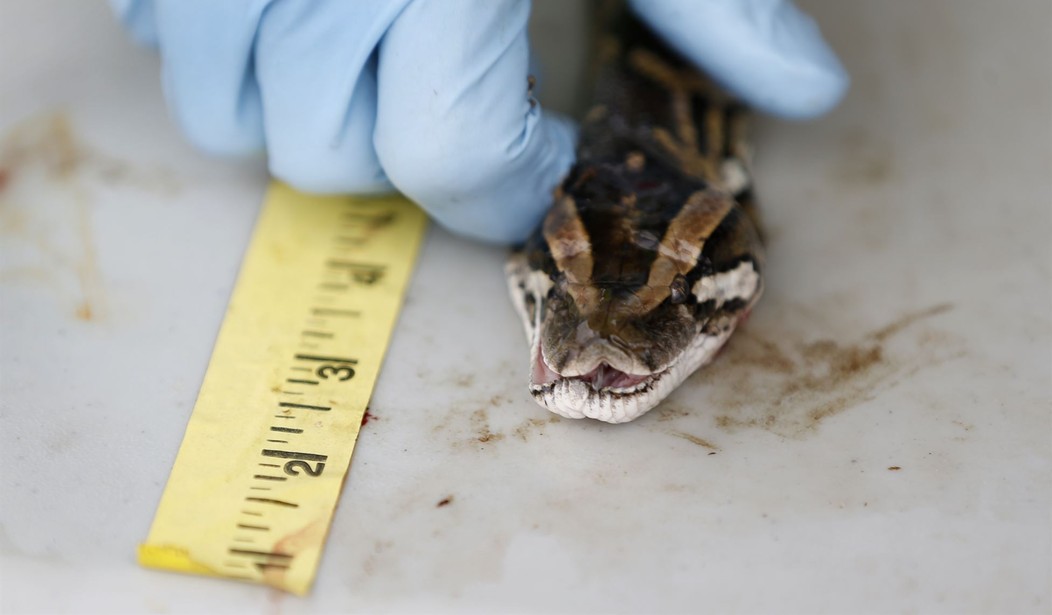Who knew sustainability could be so ssssserious and yet, so ssssilly? Apparently, researchers who compiled a report suggesting that humans could potentially replace beef, poultry, and fish with – snake meat.
The idea is intriguing, of course. But given America’s dietary hissstory, it might be a hard sell for most of us.
A new study reveals that farming pythons in Southeast Asia could offer a more environmentally friendly source of meat. Researchers observed the serpents in Thailand and Vietnam for 12 months, and discovered that raising these reptiles leaves less of a carbon footprint than traditional livestock.
Of course, this is probably because snakes don’t have feet.
(Note: I will be making these stupid snake jokes all throughout this piece, so just bear with me. I can’t help myself.)
The process of observing the snakes, along with the conclusions reached by the researchers are quite interesting, to say the least.
Farmed python meat may offer a more sustainable alternative to other farmed meat because they can reproduce rapidly, even when food is not abundantly available, according to a study published in Scientific Reports on Thursday.
Pythons have an "extreme biology and evolutionary slant toward extreme resource and energy efficiency," Patrick Aust, conservation specialist at nonprofit People for Wildlife and co-author of the paper, told ABC News. Since pythons are an "ambush predator" that chooses prey up to 100% their own weight, they can survive for prolonged periods of time between meals, Aust said.
"These animals are extremely good converters of food and particularly protein," he said. "Literally, they are specialists and making the most of very little."
The pythons were fed on a weekly basis a variety of locally sourced proteins, such as wild-caught rodents and fishmeal, and were regularly measured and weighed over a 12-month period, according to the paper. The authors found that both species of python grew rapidly -- by up to 46 grams per day -- with females seeing higher growth rates than males.
Pythons might not be the first choice for dinner plans in most American households, but if these people get their way, we could see this peculiar delicacy slithering into our ovens.
Daniel Natusch, a herpetologist and biodiversity expert involved in the study, told the Washington Post that “A python can live off the dew that forms on its scales. In the morning, it just drinks off its scales and that’s enough,” which means humans might not have to expend so much energy feeding them.
Moreover, pythons reproduce quite rapidly, producing between 50 and 100 eggs each year, which far outpaces the reproductive rates of traditional livestock.
There you have it, folks. If you don't like snakes on a plane, perhaps you might prefer snakes on a plate?
However, some are not on board with the idea. Animal rights organizations have cried foul on the possibility of eating snakes because their mission is to ruin everything good in life. Danielle Katz, senior director of campaigns for People for the Ethical Treatment of Animals, said: “Pythons can feel pain and fear, and they don’t want to be slaughtered any more than a cow, pig, chicken, or dog does.”
Naturally, these people believe prioritizing plant-based diets would be a more effective and humane solution to the climate crisis.
Of course, it might be quite a while before Americans are convinced to add Python Patties™ to their Fourth of July BBQ menu. But it might be more of a hit than the craze over cultivated meat. Also, it sure beats eating bugs, does it not?
On a serious note, those seeking more energy-efficient ways to consume food are coming up with a myriad of ideas to find sustainable solutions. Some might catch on, while others don’t. The issue isn’t whether people will expand their horizons when it comes to food. The issue is whether the objective is to have the state dictate what we are allowed to eat.
If people wish to dine on snakes, bugs, and fake meat, they should have the freedom to do so. But they should also have the freedom to stick with beef, poultry, pork, and fish if they so choose. This will be the upcoming battle that we will have to fight.
However, if snakes wind up becoming a culinary hit, it can’t be all bad. After all, who would have ever thought that we might live in an age where snakes have to worry about being bitten by humans?












Join the conversation as a VIP Member